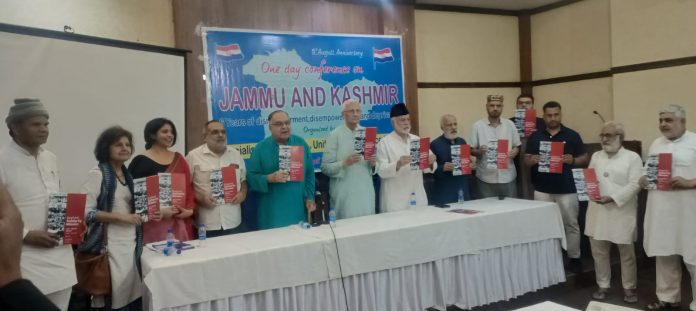– Mohd.Naushad Khan
On the fifth anniversary of Article 370’s abrogation, the Socialist Party (India) and United Peace Alliance held a one-day national conference. The event took place at the Press Club of India under the theme: “Jammu and Kashmir: Six Years of Dismemberment, Disempowerment and Deprivation.”
A key highlight was the release of a fact-finding report by the Kashmir Solidarity Mission. The mission was a week-long investigation into recent violence and the broader political and humanitarian crisis in the region.
After violent clashes in Jammu and Kashmir between May 7 and 12, a 15-member team visited the region. Led by journalist and Socialist Party leader Mir Shahid Saleem, the delegation traveled from May 25 to 31. They covered seven districts: Jammu, Rajouri, Poonch, Pulwama, Uri, Srinagar, and Anantnag.
The goal was to document real-life experiences, hear grievances, and provide a counter-narrative to the dominant media discourse.
The findings were disturbing. The team heard stories of trauma, displacement, repression, and alienation. Survivors, displaced families, students, teachers, and civil society members shared their pain. A common thread in these testimonies was a loss of faith in the political system and democratic rights. All demanded justice, dignity, and a real political voice.
Political leaders who attended the report release echoed these concerns.
Rajya Sabha MP Manoj Jha (RJD) condemned the criminalisation of dissent. He mentioned how displaying a Palestinian flag in his office is now seen as subversive. Jha said he had warned the Union Home Minister in 2019 not to make Kashmir “another Palestine.” He criticised the silencing of Kashmiri voices. “Strength lies in listening, not silencing,” he said.
Muzaffar Shah, president of the Jammu and Kashmir Awami National Conference, also spoke. He questioned the government’s celebration of August 5 while no public events are allowed in Srinagar. He called the removal of Article 370 a breach of constitutional trust. Shah said the provision was a legal pact, backed by Sardar Patel and Mahatma Gandhi.
He also criticised The Kashmir Files movie for distorting facts. He acknowledged the pain of Kashmiri Pandits but blamed the Centre for not ensuring their safe return. Shah accused the Supreme Court of failing to protect constitutional values. He demanded a clear plan for restoring statehood and democracy in J&K.
Former MP Mohammed Adeeb added historical insight. He recalled how leaders like Sheikh Abdullah joined India in trust, which is now broken. He warned against increasing communal division. “India is no longer secular in spirit or democratic in practice,” he said. He urged Gandhi’s supporters to unite against authoritarianism.
Sandeep Pandey, General Secretary of Socialist Party (India), said Kashmir reflects India’s wider democratic crisis. He noted that methods used in Kashmir—illegal detentions, media control, silencing critics—are now used across India. He called the abrogation of Article 370 unconstitutional. “We can’t speak of democracy without those stripped of their rights,” he said.
O.P. Shah, Chairman of Centre for Peace and Progress, shared insights from his independent visit to Kashmir from May 5 to 18. He met students, journalists, teachers, and religious leaders. He said most Kashmiris want peace and normalcy. He condemned the May 6–10 Pahalgam terror attack that killed 26 civilians. But he stressed that Kashmiris reject violence. “They want peace between India and Pakistan, not blame games,” he said.
The Kashmir Solidarity Mission was more than just a report. It gave space to voices often left out of the national conversation. It brought attention to ground realities buried under propaganda and security concerns. It called for a national awakening on democracy, justice, and constitutional values.
As India marks five years since the end of Article 370, the mission serves as a reminder. Peace cannot come through suppression. Unity cannot grow from silence. At a time of rising authoritarianism, this mission stands as a rare act of listening and democratic courage.




